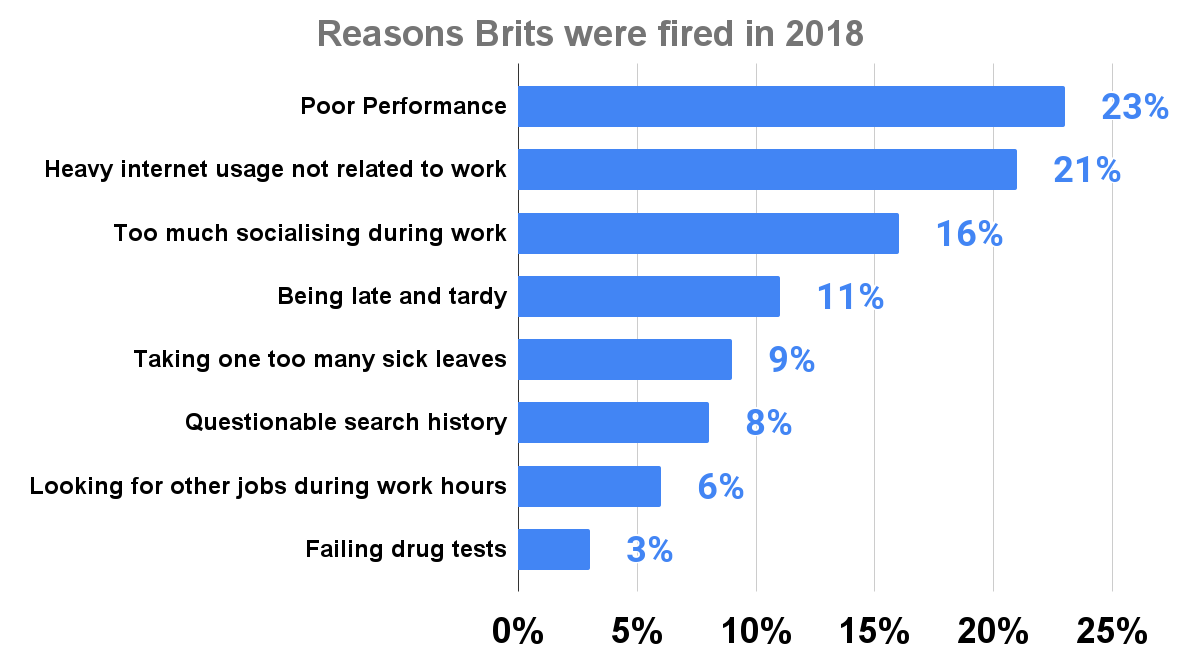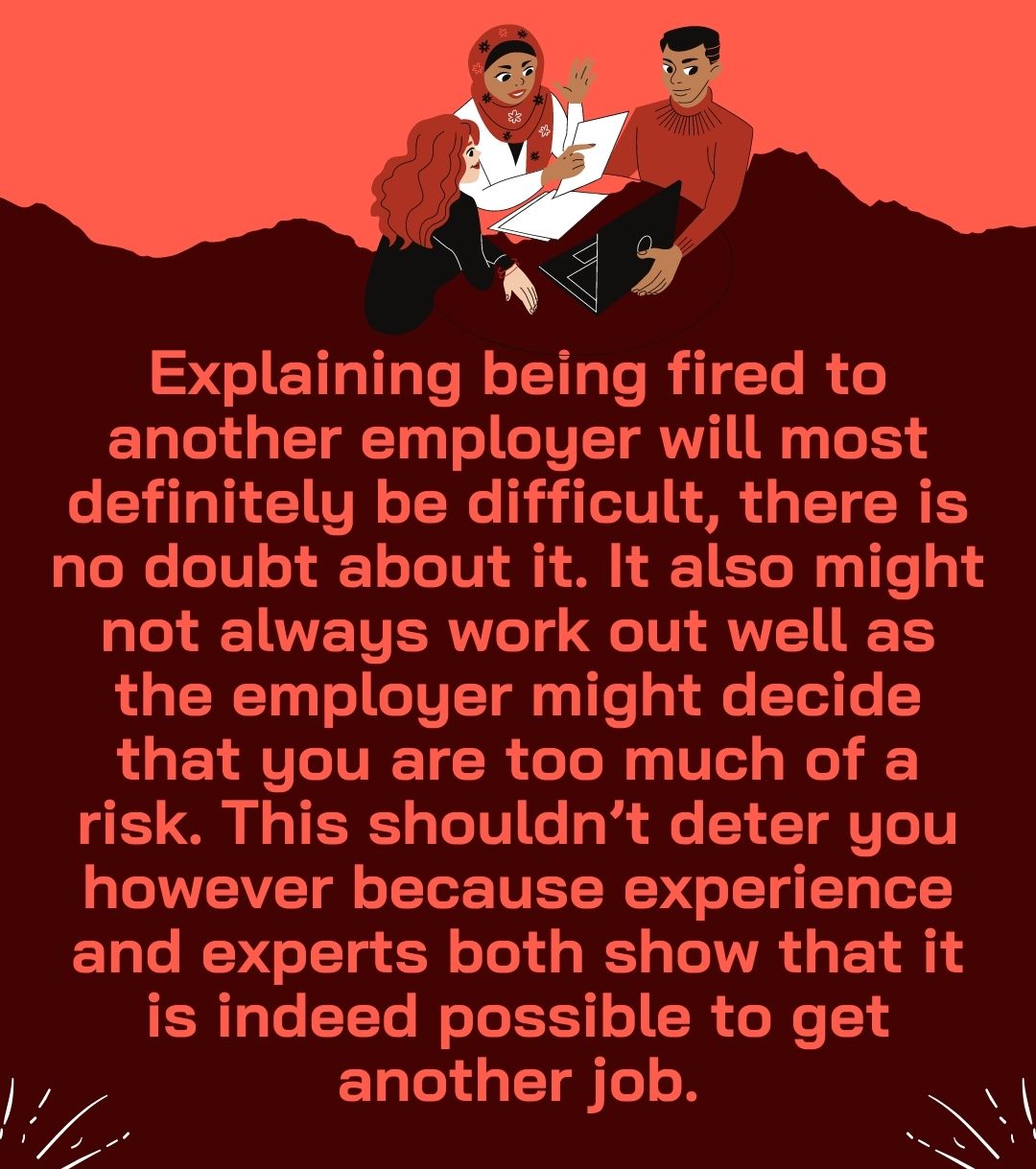How to Explain Being Fired for Misconduct - 11 Ways to Explain Getting Fired
WhatToGetMy Instructional Article
- Lots of people have been fired for misconduct from their workplace before and still managed to get another job.
- This is because humans can learn and get better and other employers can be convinced of this with the right tools of persuasion.
- Some of those tools will be discussed in this article to help give you a fighting chance at getting back into the professional world.

There are several reasons why one could be fired as shown by this graph from CEO Today. When that reason is misconduct, however, it might become an issue when trying to get another job. It is important that you know how to explain being fired for misconduct as this would aid you immensely in being able to get that job so that you can start your career afresh.
Explaining being fired to another employer will most definitely be difficult, there is no doubt about it. It also might not always work out well as the employer might decide that you are too much of a risk. This shouldn’t deter you however because experience and experts both show that it is indeed possible to get another job.

Throughout this article, we shall emphasize the value of honesty in relation to the circumstances of your being fired from your previous company as anything less would be very costly to you if your potential employer discovers otherwise.
1. Make a strong CV
The first step in how to explain being fired for misconduct does not actually see you explaining but letting your resume explain for you. With the time you get after being fired, you should try to boost your resume such that it paints you as a very qualified candidate for a job as this would make explaining getting fired much easier because the potential employer will already be impressed with you.
In your resume, include all your really strong qualifications as well as your work history. Try to take some short professional courses that will boost your knowledge and include that in your resume as well. If you have the time, try volunteering as well as this will not only boost your resume, it will give the impression that you are a better person than you were when you were fired.
When you do apply for a job, try to use letters of recommendation from any other jobs you may have had. This is good because it shows that whatever may have happened in your last job was a fluke that does not truly represent who you are. Small piece of advice – don’t explain being fired on an application, save that for the interview.
2. Be upfront about why you were fired
As mentioned earlier, there is no need to explain being fired on job applications but when you have to explain being fired in an interview, your best bet is to be completely upfront about why you got fired.
This is important because there is a good chance that if they were to ask around about you, they would find out why you got fired. It is, therefore, best to get ahead of the storm by explaining why you were fired. Also, don’t try to change the topic without explaining as it would give the impression that you are trying to hide something and no potential employer wants that baggage.
3. Remain factual about the incident
When it comes to how to explain why you were fired, try to present the facts of the case and not much else. There is no need to deviate from a professional tone by, for instance, using an apologetic tone for example: “I know I messed up by doing so and so and that was really poor from me…”
Instead, you should say something like: “I was unable to achieve the goals of the organization because we work with different styles. Where they required employees to be constantly under pressure, I believed the best way was to plan things ahead of time so as to avoid any mistakes”
This professional tone is especially useful in how to explain being fired for performance because you avoid coming off as desperate which is frowned upon by prospective employers.
4. Don’t pass the blame
When it comes to how to interview after being fired for misconduct, you should avoid trying to pass the blame to someone else, be it your previous bosses or coworkers. Being able to take responsibility for your actions is a much-admired trait in a prospective employee whilst the opposite can get the door shut in your face.
As much as you don’t have to take all the responsibility, you should try to phrase your explanation such that you take some responsibility whilst making it seem as though things really couldn’t be helped.
How to explain being fired for performance example:
When I joined the company, I didn’t have much of the necessary experience required to be instantly successful and the training I received didn’t help much with that so I wasn’t able to meet the goals set for me. That being said, I should have put in more effort to try to learn from my coworkers as well as improvise to achieve what was expected of me. I learned a great deal from the role, however, and I believe these can help me be an asset to your company.
This shows that even though you own up to your mistakes in the company, you were not completely to blame for your performance issues and you know where you could have done better.
5. Avoid complaining about your previous boss
A very important piece of advice on how to get a job after being fired for misconduct is that you should avoid complaining about your previous bosses. Prospective bosses don’t like that because the implication is that if you can do it for your previous bosses, you can do it for them as well.
Talk about them with a neutral tone and with no malice regardless of how you might truly feel as this would help you come across as a professional.
6. Talk about why it won’t happen again
So you made a mistake, how did you go about fixing it? This is very important in how to interview after being fired for misconduct because your prospective employers will be very interested in knowing how they can avoid whatever misconduct you were fired for.
Mention how you grew from the experience and the steps you took to ensure that such does not happen again, for instance, courses you may have taken to boost your skillset.
How to explain being fired in a job interview example:
I was let go from my previous role for getting into an altercation with a colleague over some workplace issues. He had been saying negative things about me to paint me as inefficient and when I found out, I approached him publicly and it led to an altercation. After I was let go, I spoke to a therapist who helped me realize that there were several ways I could have resolved the issue without it leading to violence such as reporting to HR. I have therefore grown from the experience and am certain something of that nature will not happen again.
7. Steer away from the termination when you can
As soon as you can, try to gravitate the conversation away from termination. Wait for the right opportunity to do so however so that it does not seem as though you are not forthcoming about the reason you were let go.
When you can, talk about your skills as what you can offer the company. This can come in response to questions you ask about what the company requires from its employees. You will be better able to do these if you keep the interview as lighthearted as possible.
8. Talk about your other professional history
If you have only been fired for misconduct once, it means that you have probably worked at other places where your employment was not tainted by being fired for misconduct. Be sure to emphasize the work you did in these roles.
This will have the effect of showing that you being fired for misconduct was a one-time thing that should not affect your prospects for the current job. Employers rarely employ someone based on their performance in one job and instead try to look for a pattern in your entire work history. If you did a good job in your other roles, therefore, you stand a good chance of being employed.
9. Make a good first impression
When it comes to how to explain being fired for misconduct, you would have already lost the battle if you don’t make a good first impression when you show up for your job interview. You need your prospective employers to have a positive feeling about you even before the interview commences as this would help you to better explain your situation.
Exude professionalism when you show up for your interview by arriving early and dressing professionally and appropriately. Also, put your phone on silent to avoid any distractions. An added advantage of showing up early for your interview is that it would help you explain being fired for tardiness if that was the misconduct you had been let go for as it would show that you have learned from your mistakes.
10. Remain positive
This is very important when it comes to what to do after being fired for misconduct. You cannot allow yourself to be eaten up by the situation because it would affect your confidence and this will probably affect you negatively during an interview.
You made a mistake, you got let go, but you are now better for it. You saw what you did wrong and now you won’t let it happen again. Remind yourself of your various skills and how it would be an asset to have you. Don’t put yourself down because you aren’t the first to have gone through it and you won’t be the last. You will, however, join the rank of those who managed to survive being let go for misconduct.
Related article: How to Make Yourself Feel Better when Sad.
11. Reach out to your previous employer if you can
If circumstances surrounding your leaving the company are not so bad that you cannot reach out to them, consider doing so. Tell them how you have grown from the mistakes you made and how you hold no grudges towards them.
This could improve your chances of getting a favorable reference from them if they are called by a company you applied to. Even if the company does not give you a reference, someone there just might.
Related article: Signs You Either Didn’t Get the Job or Will Get the Job After Interview.
Frequently Asked Questions
1. What are examples of being fired for misconduct?
Some examples of misconduct that can get you fired are:
- Violating company policy
- Offensive behavior towards coworkers
- Being insubordinate to your superiors
- Excessively being late and tardy
- Lying about your qualifications
- Any form of theft or fraudulent activity
- Alcohol and drug abuse
2. How do you explain being fired for violating company policy?
- You should be upfront about what policy you violated
- You should stick to the facts of the situation.
- You should take responsibility for the situation.
- Explain why the situation will not repeat itself
- Find a way to move on from the conversation as quickly as possible to allow you to talk about your skills and what else you can bring to the table
3. Can I get a job if I was fired for misconduct?
It is very much possible to get a job after being fired for misconduct so long as you follow certain guidelines such as:
- Being upfront about why you were fired
- Taking responsibility
- Explaining what you have done to ensure the situation will not repeat itself
- Steering the conversation away from the misconduct as soon as you can
- Making a good first impression
In conclusion
When explaining why you got fired by talking about how you were not a good fit, be sure to only use this if you’re applying to a company that does not operate the same way your previous company did.
Remember, be upfront about why you were fired, keep it factual, and don’t pass responsibility to someone else. If you were fired for a very bad reason, and explaining it fully will most likely sabotage your chances, very carefully avoid explaining just how severe the situation was but do try to avoid lying as this will almost always come back to hurt you.
54 MINUTES
ESTIMATED TIME DESIGNING AND UPLOADING THIS ARTICLE
10 HOURS 32 MINUTES
ESTIMATED TIME RESEARCHING AND WRITING THIS ARTICLE
You Might Also Like

Have you ever been protected or vouched by your boss from something you did for the company? How about a coworker covering up your schedule or activity because you have to attend an emergency? Then you must have had that grateful feeling towards them. If

5 Signs That Your Coworkers Don’t Like You
5 Signs That Your Coworkers Don’t Like You WhatToGetMy Instructional Article Toxic work environments negatively affect people’s mental health and productivity. Oftentimes, toxic work environments are caused by coworkers having nasty attitudes towards each other and this goes unchecked and unpunished. To find out how

11 Ways to Know if Someone Wants to Be Your Friend
11 Ways to Know if Someone Wants to Be Your Friend WhatToGetMy Instructional Article Most of us like to surround ourselves with friends. We expect those friends to be there for us when we need them and vice versa. We want them to listen to


